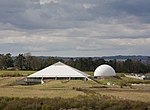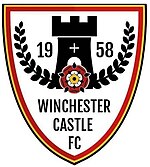Twyford Down is an area of chalk downland lying directly to the southeast of Winchester, Hampshire, England next to St. Catherine's Hill and close to the South Downs National Park. It has been settled since pre-Roman times, and has housed a fort and a chapel, as well as being a 17th and 18th century coaching route.
In 1991, the down was the site of a major road protest against a section of the M3 motorway from London to the south coast of England. There had been plans since the 1970s to replace the 1930s Winchester bypass which was regularly congested due to design features that had become out of date. This was problematic owing to the lack of available land between Winchester College and St. Catherine's Hill. After several public inquiries, particularly with using the water meadows near the college, a route was chosen that took the motorway over the down in a cutting. Although protests against the M3 had been ongoing since the early 1970s, the protest-action on top of the down, described in 1994 as the most controversial British motorway project ever to start construction, attracted a wider range of classes of people than had previously been the case, and included physical violence from onsite security officers.
The motorway was completed as planned and provides a link of continuous motorway between Greater London and the South Coast ports. Nevertheless, the protests attracted interest from the national media, and drew attention to this form of campaigning. Subsequent road schemes took greater account of the environment or were cancelled. Several protesters at Twyford Down subsequently formed campaign groups, or joined existing ones such as the Campaign for Better Transport.












